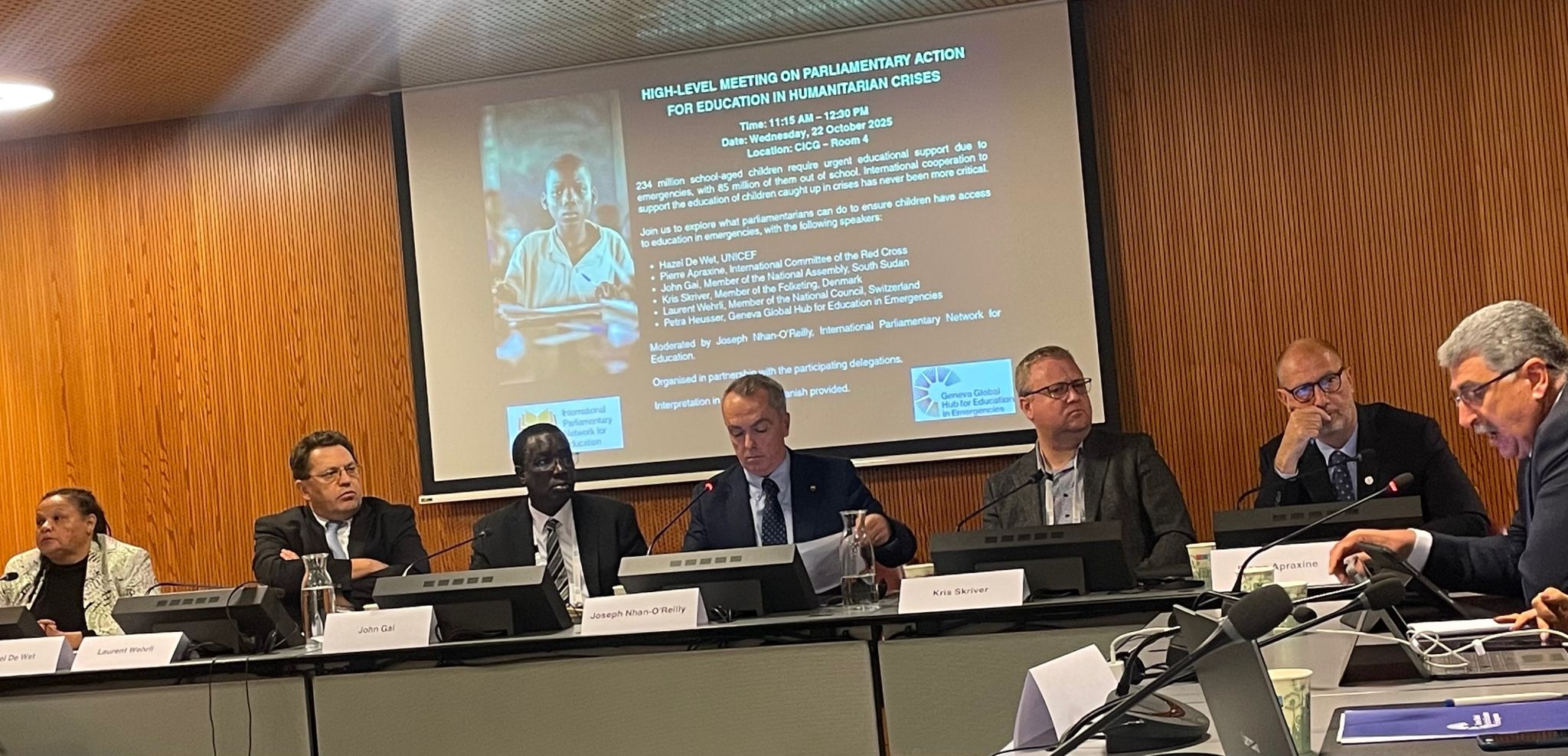Event Highlights: High-Level Meeting on Parliamentary Action for Education in Humanitarian Crises
“Whoever destroys a school is destroying an entire nation.”
– Musa Hadid, Deputy Chairman of the Palestinian National Council
On 22nd October 2025, Moira Faul, the Executive Director of NORRAG, participated in this Inter-Parliamentary Union Assembly side event organised by the International Parliamentary Network for Education (IPNEd) and Geneva Global Hub for Education in Emergencies.
Hazel De Wet (UNICEF) first spoke on the impact of foreign aid cuts on education, then Pierre Apraxine (International Committee of the Red Cross – ICRC) urged the participants to uphold International Humanitarian Law and protect education during conflict.
Musa Hadid, Deputy Chairman of the Palestinian National Council, spoke of the unprecedented devastation to the education sector in Gaza and Dr. John Gai (former Minister of Education in South Sudan) discussed the extreme challenges of providing education in the midst of an active conflict. Laurent Wehrli, a Swiss Parliamentarian, reminded the audience that COVID-19 showed the importance of education in emergencies, even in rich countries. Kris Jensen Skriver, a Danish Parliamentarian, explained how Denmark had maintained strong support for multilateralism across the political spectrum.
Moira Faul then emphasised that teachers are not simply service providers, but they are a living embodiment of the Humanitarian–Development–Peace Nexus, who could be supported by parliamentarians in two key ways. First, national policies must ensure that in emergencies displaced teachers can be incorporated into national systems, and that every teacher is prepared for emergencies and should include training on crisis response, climate adaptation and remote learning. Secondly, she highlighted the urgent need for flexible and sustained investment from governments and donors. Particularly, funding must prioritise teacher recruitment, inclusion, professional development, and fair working conditions in crisis-affected and remote areas.In conclusion, she reminded us that caring for learners means caring for the teachers who, in turn, care for them. Thus, funding for education and supporting teachers is not a cost nor is it charity. Instead, it is an investment in building collective resilience and in the social fabric that connects humanitarian response, development, and peace.
The event, which was moderated by Joseph Nhan-O’Reilly (IPNEd) was closed by Apolline Montoya (Global Coalition to Protect Education from Attack) and Petra Heusser (Geneva Global Hub for Education in Emergencies.
Interested in these topics?
NORRAG is publishing a Policy Insights collection on 9 December on The Humanitarian-Development-Peace Nexus at 10, curating contributions from 49 authors from 4 continents, examining cases in 37 different countries, as well as global challenges. The publication focuses on 5 key themes:
- Taking stock: Examining structural issues and the Nexus’s relevance in a changing aid landscape.
- Centering humanity: Social and Emotional Learning (SEL), and psychosocial support (PSS) for learners, teachers and families.
- Teaching at the heart of the nexus: Focusing on teachers as critical Nexus actors who drive just peace solutions, well-being, and agency.
- Leading locally: Empowering communities, local governance, and women-led organizations.
- Making the connections necessary for sustained financing, evidence bridging, coordination across the full HDP Nexus, and anticipatory action.
Sign up here to receive updates on the launch event and publication.

